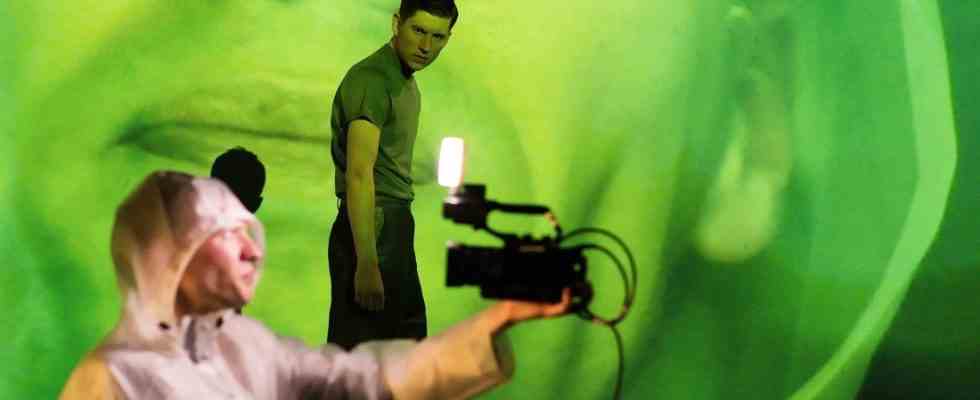Viktor Martinovich doesn’t want to pretend to be a hero. “It’s not my thing to write abroad,” he says. As an author, he has to stay in his home country, in the middle of his country, in his language and culture. And perhaps more importantly, the books that will soon tell of this “dark, dark, dark time” must come from within. Not from the outside, he is convinced of that. Viktor Martinovich is from Belarus. The 45-year-old writer lives in Minsk, his books have disappeared from bookshops in his homeland. The publishers that published them were closed. His arrest is a real threat. There are people with fewer dangers in their lives who consider themselves heroes.
Martinowitsch tells in English at his reading in the Munich Volkstheater. He is grateful to be here, to have a public that is denied to him at home. He traveled 30 hours to present his new book “Nacht” (Europa Verlag). He will only see the German edition here, taking a copy home is too dangerous for him. That’s what his German publisher says, while Martinowitsch sits next to him, attentive and at the same time withdrawn. You can read in his eyes that he has already seen too much.
When times were different, as Martinowitsch says, he wrote the novel “Revolution”. This was published in 2017, four years later also in German. The great book is another reason why the author is at the Volkstheater that day: resident director Philipp Arnold has adapted “Revolution” for the stage, and the premiere is in the evening. The novel is about power, a secret society in Moscow and a young academic who, initially involuntarily, then willingly, pursues a career in this society. If you take the author’s biography, the current situation and the subject together, it’s astonishing how little political “revolution” turns out to be at Volkstheater.
In his homeland, Viktor Martinowitsch’s books have disappeared from the book trade.
(Photo: Kasia Syramalot)
Director Arnold made a clear decision to leave Martinowitsch’s mind game about the seductive power and manipulative power of power, which the author wrote down as a witty, witty confession of his protagonist’s life, in the abstract. He relies on the parable, not on the reference to current reality. But how much parabola is reasonable at a time when the world is exploding and exploding? Probably only one that bores deep and bitterly into the abyss. And that doesn’t work out – despite many beautiful staged ideas – on this evening.
The protagonist’s path to the pinnacle of power begins with an accident
The central character in the novel and on the stage is Mikhail Alexeyevich German, a lecturer in architectural semiotics. One day he is involved in an accident and money is extorted from him, which – disguised as a rescue – is made available to him by an ominous secret society. Of course, one expects something in return, such as making false statements in court or letting traitors die. The leader of the alliance is Batja, flanked by three “apostles” who are responsible for communication, surveillance and use of force.
German continues to rise in the league, but is said to give up his relationship. That becomes the sticking point for him, which is why he instigates a revolution, undermines the federation and sits at its head. German tells this in retrospect, supposedly fighting for his relationship, which he once sacrificed for power.
Steffen Link is now this German, a little academic boy in a much too big suit, a kind of principle rider who only knows humor from the dictionary. A guy who thinks he can threaten two potential assassins with the emergency button on his cell phone. Windy, yes he is silly. When someone like that comes to power, bad things can come of it. Link plays that great, German is not a ruler for him, but an instrument of power. It practically flows through him and causes damage everywhere. So in order to destroy, you don’t have to be evil at all, you just have to be unable to resist. That is a bitter, true thought, the strongest of this evening.
The powerful who take the German by Steffen Link (centre) in the pincers often do not appear threatening. Even if they are played by Jakob Immervoll (left) and Pascal Fligg.
(Photo: Gabi Neeb)
Unlike Martinowitsch, Arnold’s German is homosexual. Lorenz Hochhuth interprets his partner Oleg with beautifully curved straight lines. He is German’s conscience, which keeps appearing on stage and to which German nervously justifies himself. He slowly turns to a partner who is more comfortable for him, Sascha, one of his students. Anton Nürnberg has cleverly created it as a toxic mixture of ingratiating sunny boy and calculating careerist. In between, the three apostle characters Pascal Fligg, Maral Keshavarz and Jakob Immervoll as well as Elke Petri’s Batja wriggle across the stage as a surprisingly unthreatening secret society over long stretches. The dangerous, ugly side of the Force, it’s barely noticeable. Which of course would have been helpful in an evening that talked about it.
Nevertheless, this does not pull the plug on the staging, because it has an aesthetic power center, something cinematic. Belle Santos basically set up the stage with three large screens, one of which takes up the entire background, the other two are movable walls. They are the projection surfaces for the intensively used live camera images and videos (Sebastian Pircher). Both are meaningful parts of the stage narrative here, open up new spaces, are able to draw you into German’s maelstrom. The fact that one emerges from this in the end quite intact is due to the fact that one does not despair of this harmless power.

